Analysis of Administrative and Contract Law: A Comprehensive Report
VerifiedAdded on 2020/06/05
|9
|2730
|32
Report
AI Summary
This report provides a comprehensive overview of administrative and contract law, examining the roles of the judiciary in legal decision-making. It analyzes the case of Miller v SS for Exiting the EU, focusing on the application of Article 50 and the concept of parliamentary sovereignty. The report explores the legal obligations of judges, the principles of impartiality within the judiciary, and the impact of judicial decisions on public opinion and financial markets. Furthermore, it discusses the application of constitutional law and the interpretation of laws and regulations by the judiciary. The report also highlights the importance of an independent judiciary in upholding the rule of law and emphasizes how judges are required to make decisions based on facts, legal rules, and regulations. The report concludes with a summary of the key findings and their implications for the legal system.
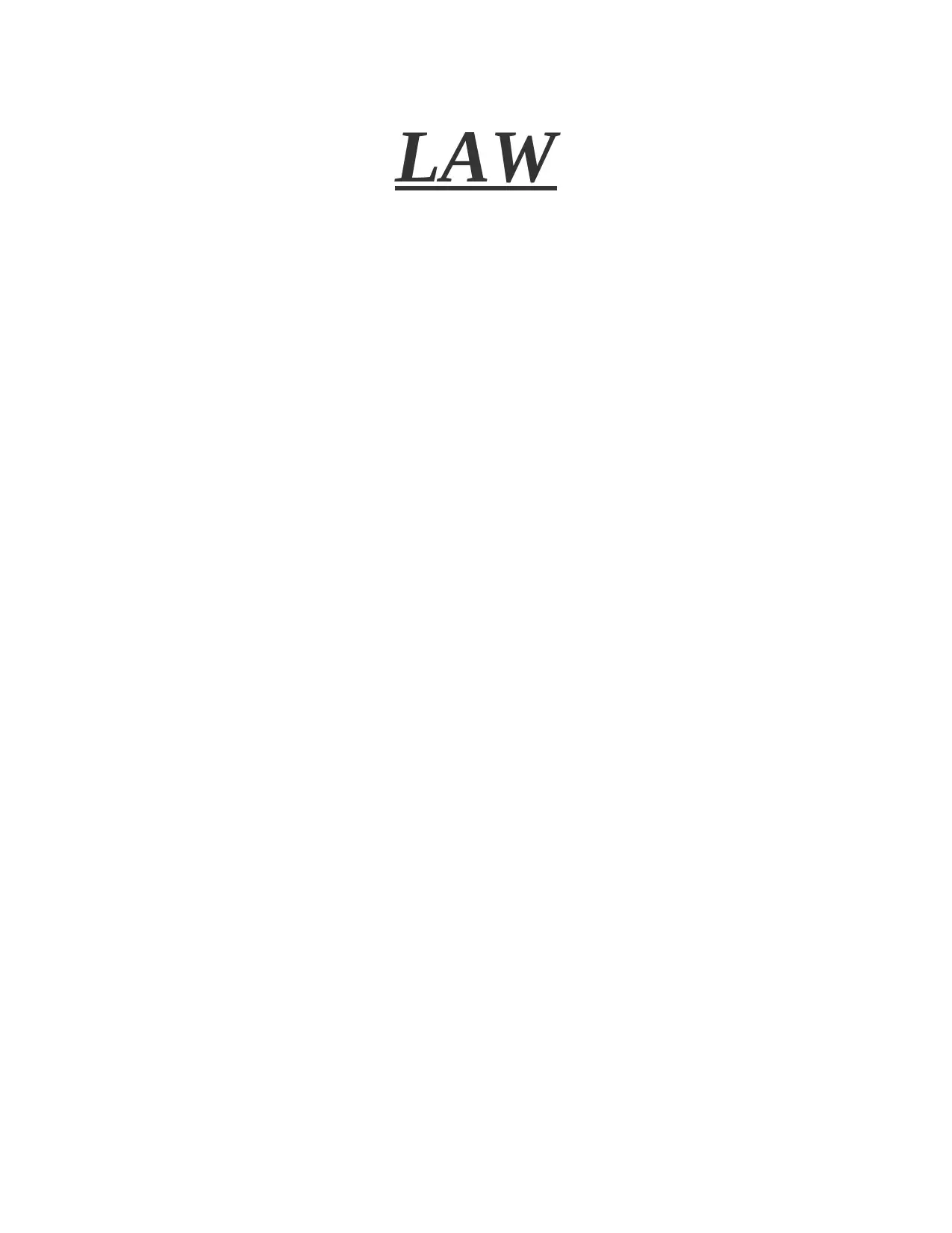
LAW
Paraphrase This Document
Need a fresh take? Get an instant paraphrase of this document with our AI Paraphraser
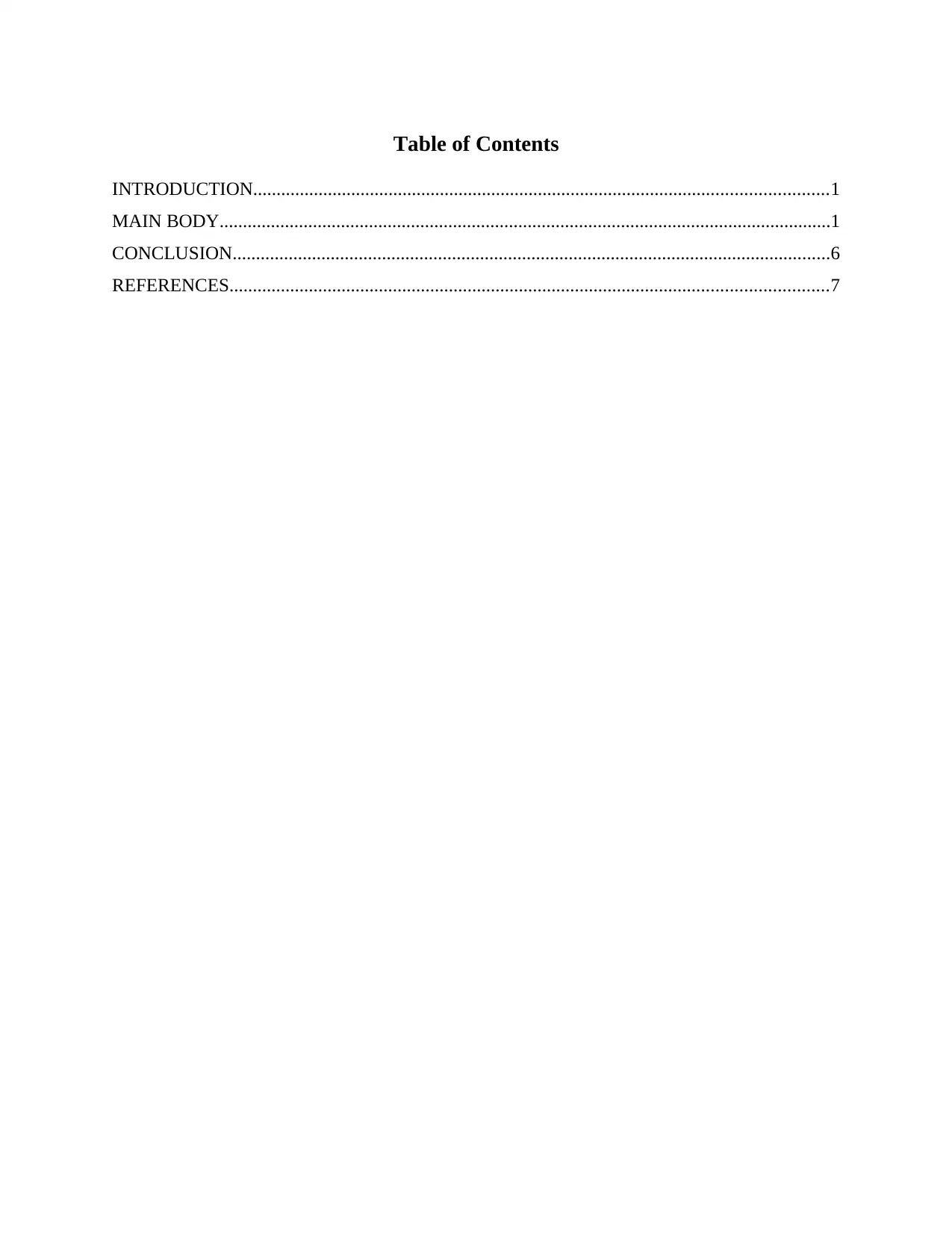
Table of Contents
INTRODUCTION...........................................................................................................................1
MAIN BODY...................................................................................................................................1
CONCLUSION................................................................................................................................6
REFERENCES................................................................................................................................7
INTRODUCTION...........................................................................................................................1
MAIN BODY...................................................................................................................................1
CONCLUSION................................................................................................................................6
REFERENCES................................................................................................................................7
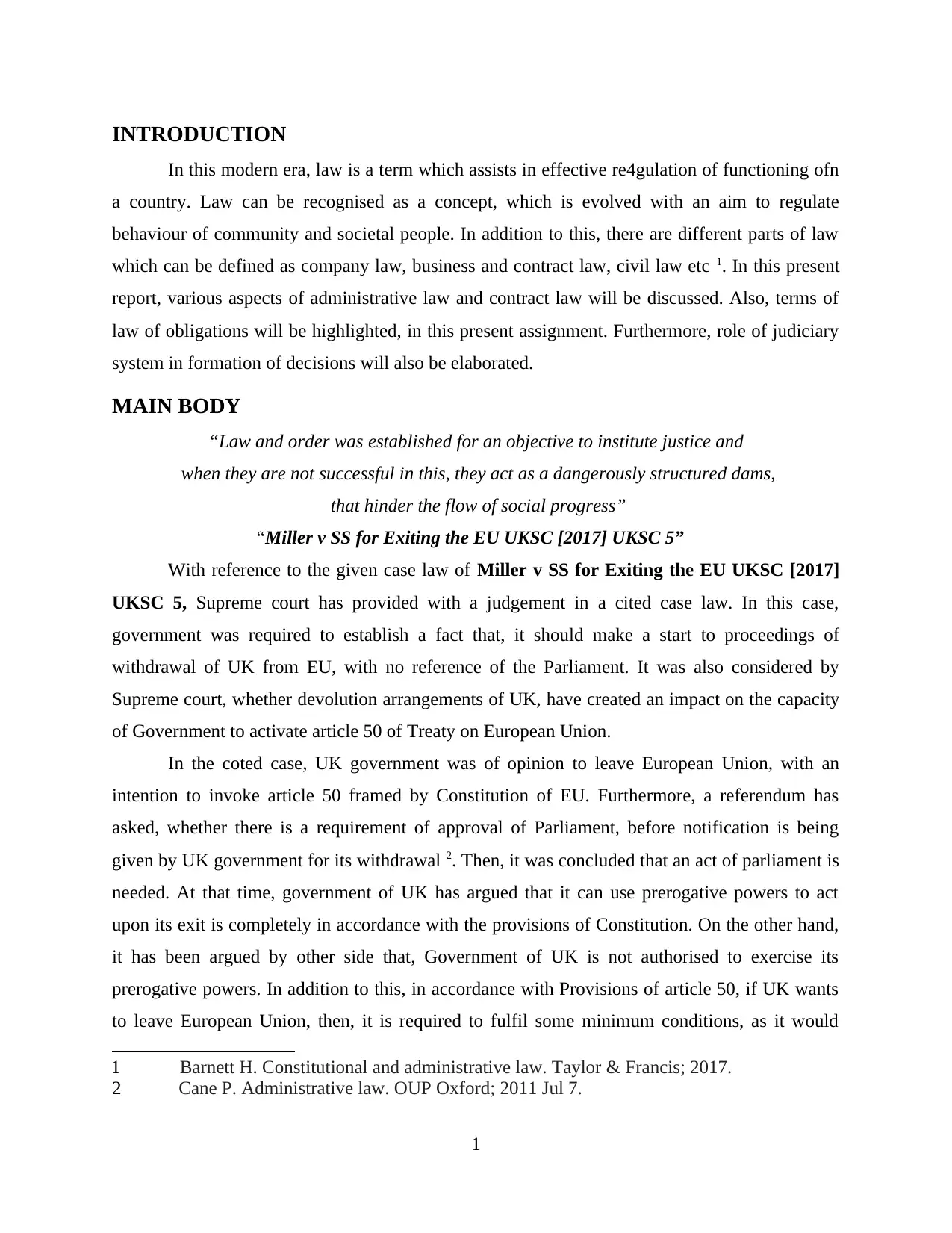
INTRODUCTION
In this modern era, law is a term which assists in effective re4gulation of functioning ofn
a country. Law can be recognised as a concept, which is evolved with an aim to regulate
behaviour of community and societal people. In addition to this, there are different parts of law
which can be defined as company law, business and contract law, civil law etc 1. In this present
report, various aspects of administrative law and contract law will be discussed. Also, terms of
law of obligations will be highlighted, in this present assignment. Furthermore, role of judiciary
system in formation of decisions will also be elaborated.
MAIN BODY
“Law and order was established for an objective to institute justice and
when they are not successful in this, they act as a dangerously structured dams,
that hinder the flow of social progress”
“Miller v SS for Exiting the EU UKSC [2017] UKSC 5”
With reference to the given case law of Miller v SS for Exiting the EU UKSC [2017]
UKSC 5, Supreme court has provided with a judgement in a cited case law. In this case,
government was required to establish a fact that, it should make a start to proceedings of
withdrawal of UK from EU, with no reference of the Parliament. It was also considered by
Supreme court, whether devolution arrangements of UK, have created an impact on the capacity
of Government to activate article 50 of Treaty on European Union.
In the coted case, UK government was of opinion to leave European Union, with an
intention to invoke article 50 framed by Constitution of EU. Furthermore, a referendum has
asked, whether there is a requirement of approval of Parliament, before notification is being
given by UK government for its withdrawal 2. Then, it was concluded that an act of parliament is
needed. At that time, government of UK has argued that it can use prerogative powers to act
upon its exit is completely in accordance with the provisions of Constitution. On the other hand,
it has been argued by other side that, Government of UK is not authorised to exercise its
prerogative powers. In addition to this, in accordance with Provisions of article 50, if UK wants
to leave European Union, then, it is required to fulfil some minimum conditions, as it would
1 Barnett H. Constitutional and administrative law. Taylor & Francis; 2017.
2 Cane P. Administrative law. OUP Oxford; 2011 Jul 7.
1
In this modern era, law is a term which assists in effective re4gulation of functioning ofn
a country. Law can be recognised as a concept, which is evolved with an aim to regulate
behaviour of community and societal people. In addition to this, there are different parts of law
which can be defined as company law, business and contract law, civil law etc 1. In this present
report, various aspects of administrative law and contract law will be discussed. Also, terms of
law of obligations will be highlighted, in this present assignment. Furthermore, role of judiciary
system in formation of decisions will also be elaborated.
MAIN BODY
“Law and order was established for an objective to institute justice and
when they are not successful in this, they act as a dangerously structured dams,
that hinder the flow of social progress”
“Miller v SS for Exiting the EU UKSC [2017] UKSC 5”
With reference to the given case law of Miller v SS for Exiting the EU UKSC [2017]
UKSC 5, Supreme court has provided with a judgement in a cited case law. In this case,
government was required to establish a fact that, it should make a start to proceedings of
withdrawal of UK from EU, with no reference of the Parliament. It was also considered by
Supreme court, whether devolution arrangements of UK, have created an impact on the capacity
of Government to activate article 50 of Treaty on European Union.
In the coted case, UK government was of opinion to leave European Union, with an
intention to invoke article 50 framed by Constitution of EU. Furthermore, a referendum has
asked, whether there is a requirement of approval of Parliament, before notification is being
given by UK government for its withdrawal 2. Then, it was concluded that an act of parliament is
needed. At that time, government of UK has argued that it can use prerogative powers to act
upon its exit is completely in accordance with the provisions of Constitution. On the other hand,
it has been argued by other side that, Government of UK is not authorised to exercise its
prerogative powers. In addition to this, in accordance with Provisions of article 50, if UK wants
to leave European Union, then, it is required to fulfil some minimum conditions, as it would
1 Barnett H. Constitutional and administrative law. Taylor & Francis; 2017.
2 Cane P. Administrative law. OUP Oxford; 2011 Jul 7.
1
⊘ This is a preview!⊘
Do you want full access?
Subscribe today to unlock all pages.

Trusted by 1+ million students worldwide
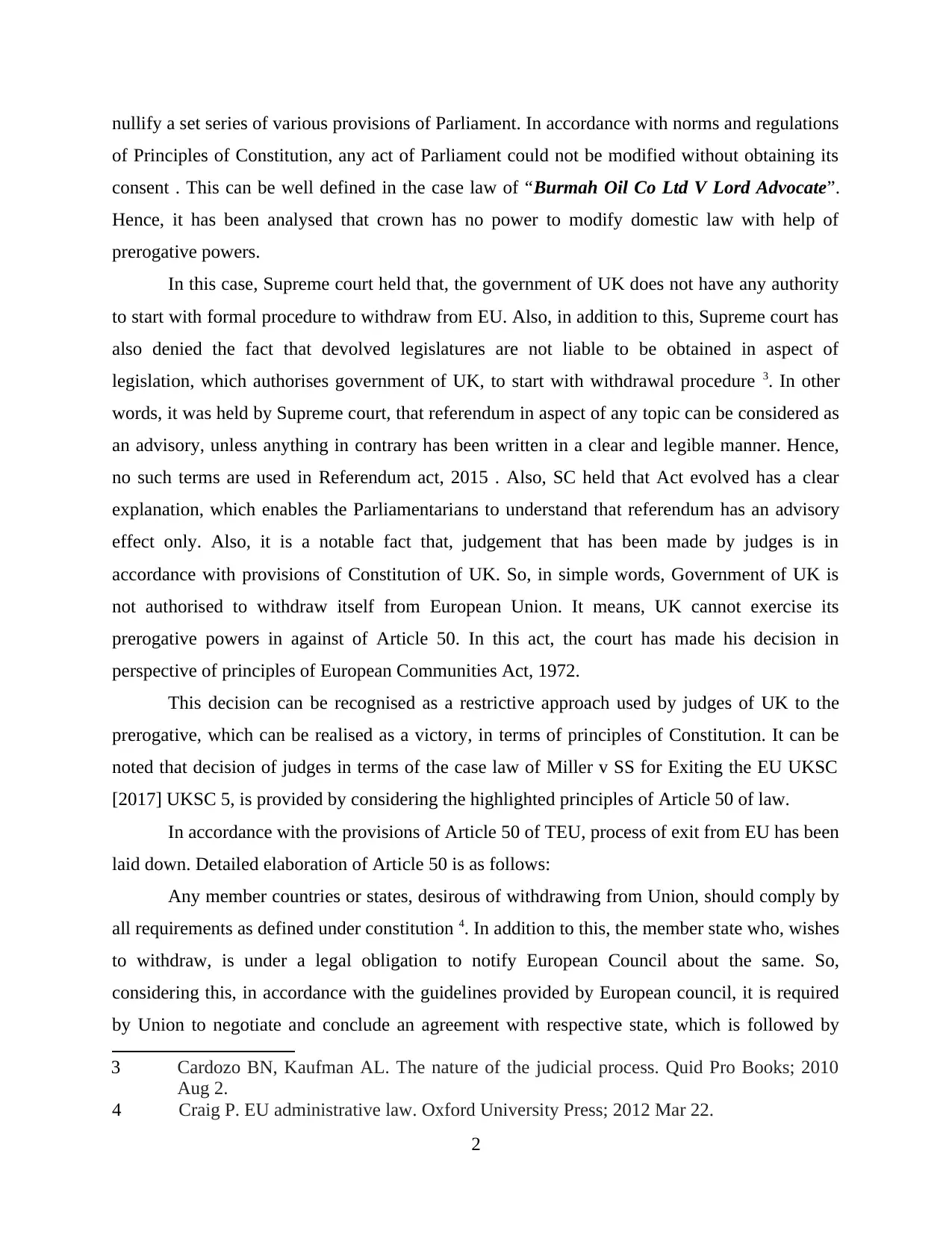
nullify a set series of various provisions of Parliament. In accordance with norms and regulations
of Principles of Constitution, any act of Parliament could not be modified without obtaining its
consent . This can be well defined in the case law of “Burmah Oil Co Ltd V Lord Advocate”.
Hence, it has been analysed that crown has no power to modify domestic law with help of
prerogative powers.
In this case, Supreme court held that, the government of UK does not have any authority
to start with formal procedure to withdraw from EU. Also, in addition to this, Supreme court has
also denied the fact that devolved legislatures are not liable to be obtained in aspect of
legislation, which authorises government of UK, to start with withdrawal procedure 3. In other
words, it was held by Supreme court, that referendum in aspect of any topic can be considered as
an advisory, unless anything in contrary has been written in a clear and legible manner. Hence,
no such terms are used in Referendum act, 2015 . Also, SC held that Act evolved has a clear
explanation, which enables the Parliamentarians to understand that referendum has an advisory
effect only. Also, it is a notable fact that, judgement that has been made by judges is in
accordance with provisions of Constitution of UK. So, in simple words, Government of UK is
not authorised to withdraw itself from European Union. It means, UK cannot exercise its
prerogative powers in against of Article 50. In this act, the court has made his decision in
perspective of principles of European Communities Act, 1972.
This decision can be recognised as a restrictive approach used by judges of UK to the
prerogative, which can be realised as a victory, in terms of principles of Constitution. It can be
noted that decision of judges in terms of the case law of Miller v SS for Exiting the EU UKSC
[2017] UKSC 5, is provided by considering the highlighted principles of Article 50 of law.
In accordance with the provisions of Article 50 of TEU, process of exit from EU has been
laid down. Detailed elaboration of Article 50 is as follows:
Any member countries or states, desirous of withdrawing from Union, should comply by
all requirements as defined under constitution 4. In addition to this, the member state who, wishes
to withdraw, is under a legal obligation to notify European Council about the same. So,
considering this, in accordance with the guidelines provided by European council, it is required
by Union to negotiate and conclude an agreement with respective state, which is followed by
3 Cardozo BN, Kaufman AL. The nature of the judicial process. Quid Pro Books; 2010
Aug 2.
4 Craig P. EU administrative law. Oxford University Press; 2012 Mar 22.
2
of Principles of Constitution, any act of Parliament could not be modified without obtaining its
consent . This can be well defined in the case law of “Burmah Oil Co Ltd V Lord Advocate”.
Hence, it has been analysed that crown has no power to modify domestic law with help of
prerogative powers.
In this case, Supreme court held that, the government of UK does not have any authority
to start with formal procedure to withdraw from EU. Also, in addition to this, Supreme court has
also denied the fact that devolved legislatures are not liable to be obtained in aspect of
legislation, which authorises government of UK, to start with withdrawal procedure 3. In other
words, it was held by Supreme court, that referendum in aspect of any topic can be considered as
an advisory, unless anything in contrary has been written in a clear and legible manner. Hence,
no such terms are used in Referendum act, 2015 . Also, SC held that Act evolved has a clear
explanation, which enables the Parliamentarians to understand that referendum has an advisory
effect only. Also, it is a notable fact that, judgement that has been made by judges is in
accordance with provisions of Constitution of UK. So, in simple words, Government of UK is
not authorised to withdraw itself from European Union. It means, UK cannot exercise its
prerogative powers in against of Article 50. In this act, the court has made his decision in
perspective of principles of European Communities Act, 1972.
This decision can be recognised as a restrictive approach used by judges of UK to the
prerogative, which can be realised as a victory, in terms of principles of Constitution. It can be
noted that decision of judges in terms of the case law of Miller v SS for Exiting the EU UKSC
[2017] UKSC 5, is provided by considering the highlighted principles of Article 50 of law.
In accordance with the provisions of Article 50 of TEU, process of exit from EU has been
laid down. Detailed elaboration of Article 50 is as follows:
Any member countries or states, desirous of withdrawing from Union, should comply by
all requirements as defined under constitution 4. In addition to this, the member state who, wishes
to withdraw, is under a legal obligation to notify European Council about the same. So,
considering this, in accordance with the guidelines provided by European council, it is required
by Union to negotiate and conclude an agreement with respective state, which is followed by
3 Cardozo BN, Kaufman AL. The nature of the judicial process. Quid Pro Books; 2010
Aug 2.
4 Craig P. EU administrative law. Oxford University Press; 2012 Mar 22.
2
Paraphrase This Document
Need a fresh take? Get an instant paraphrase of this document with our AI Paraphraser
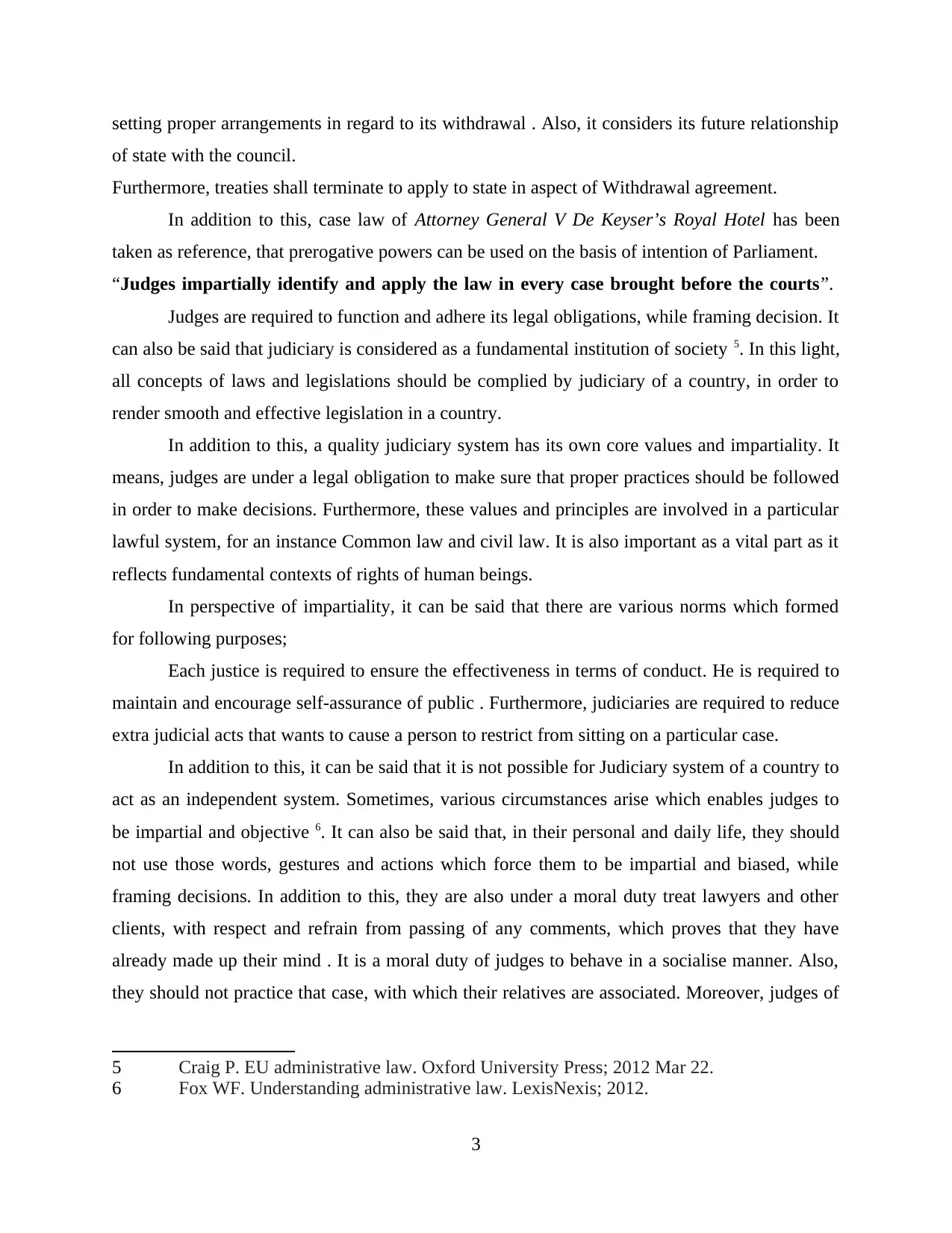
setting proper arrangements in regard to its withdrawal . Also, it considers its future relationship
of state with the council.
Furthermore, treaties shall terminate to apply to state in aspect of Withdrawal agreement.
In addition to this, case law of Attorney General V De Keyser’s Royal Hotel has been
taken as reference, that prerogative powers can be used on the basis of intention of Parliament.
“Judges impartially identify and apply the law in every case brought before the courts”.
Judges are required to function and adhere its legal obligations, while framing decision. It
can also be said that judiciary is considered as a fundamental institution of society 5. In this light,
all concepts of laws and legislations should be complied by judiciary of a country, in order to
render smooth and effective legislation in a country.
In addition to this, a quality judiciary system has its own core values and impartiality. It
means, judges are under a legal obligation to make sure that proper practices should be followed
in order to make decisions. Furthermore, these values and principles are involved in a particular
lawful system, for an instance Common law and civil law. It is also important as a vital part as it
reflects fundamental contexts of rights of human beings.
In perspective of impartiality, it can be said that there are various norms which formed
for following purposes;
Each justice is required to ensure the effectiveness in terms of conduct. He is required to
maintain and encourage self-assurance of public . Furthermore, judiciaries are required to reduce
extra judicial acts that wants to cause a person to restrict from sitting on a particular case.
In addition to this, it can be said that it is not possible for Judiciary system of a country to
act as an independent system. Sometimes, various circumstances arise which enables judges to
be impartial and objective 6. It can also be said that, in their personal and daily life, they should
not use those words, gestures and actions which force them to be impartial and biased, while
framing decisions. In addition to this, they are also under a moral duty treat lawyers and other
clients, with respect and refrain from passing of any comments, which proves that they have
already made up their mind . It is a moral duty of judges to behave in a socialise manner. Also,
they should not practice that case, with which their relatives are associated. Moreover, judges of
5 Craig P. EU administrative law. Oxford University Press; 2012 Mar 22.
6 Fox WF. Understanding administrative law. LexisNexis; 2012.
3
of state with the council.
Furthermore, treaties shall terminate to apply to state in aspect of Withdrawal agreement.
In addition to this, case law of Attorney General V De Keyser’s Royal Hotel has been
taken as reference, that prerogative powers can be used on the basis of intention of Parliament.
“Judges impartially identify and apply the law in every case brought before the courts”.
Judges are required to function and adhere its legal obligations, while framing decision. It
can also be said that judiciary is considered as a fundamental institution of society 5. In this light,
all concepts of laws and legislations should be complied by judiciary of a country, in order to
render smooth and effective legislation in a country.
In addition to this, a quality judiciary system has its own core values and impartiality. It
means, judges are under a legal obligation to make sure that proper practices should be followed
in order to make decisions. Furthermore, these values and principles are involved in a particular
lawful system, for an instance Common law and civil law. It is also important as a vital part as it
reflects fundamental contexts of rights of human beings.
In perspective of impartiality, it can be said that there are various norms which formed
for following purposes;
Each justice is required to ensure the effectiveness in terms of conduct. He is required to
maintain and encourage self-assurance of public . Furthermore, judiciaries are required to reduce
extra judicial acts that wants to cause a person to restrict from sitting on a particular case.
In addition to this, it can be said that it is not possible for Judiciary system of a country to
act as an independent system. Sometimes, various circumstances arise which enables judges to
be impartial and objective 6. It can also be said that, in their personal and daily life, they should
not use those words, gestures and actions which force them to be impartial and biased, while
framing decisions. In addition to this, they are also under a moral duty treat lawyers and other
clients, with respect and refrain from passing of any comments, which proves that they have
already made up their mind . It is a moral duty of judges to behave in a socialise manner. Also,
they should not practice that case, with which their relatives are associated. Moreover, judges of
5 Craig P. EU administrative law. Oxford University Press; 2012 Mar 22.
6 Fox WF. Understanding administrative law. LexisNexis; 2012.
3
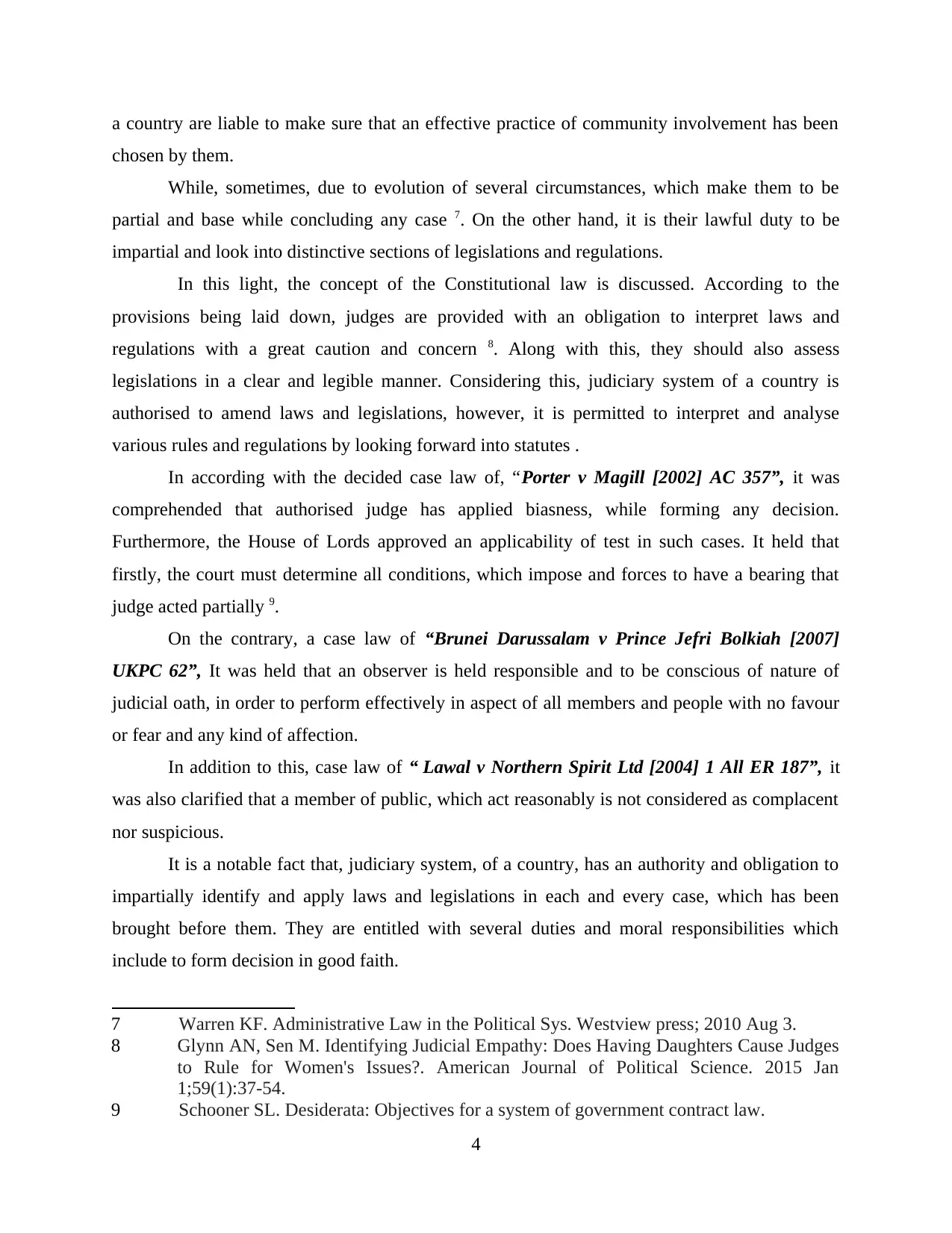
a country are liable to make sure that an effective practice of community involvement has been
chosen by them.
While, sometimes, due to evolution of several circumstances, which make them to be
partial and base while concluding any case 7. On the other hand, it is their lawful duty to be
impartial and look into distinctive sections of legislations and regulations.
In this light, the concept of the Constitutional law is discussed. According to the
provisions being laid down, judges are provided with an obligation to interpret laws and
regulations with a great caution and concern 8. Along with this, they should also assess
legislations in a clear and legible manner. Considering this, judiciary system of a country is
authorised to amend laws and legislations, however, it is permitted to interpret and analyse
various rules and regulations by looking forward into statutes .
In according with the decided case law of, “Porter v Magill [2002] AC 357”, it was
comprehended that authorised judge has applied biasness, while forming any decision.
Furthermore, the House of Lords approved an applicability of test in such cases. It held that
firstly, the court must determine all conditions, which impose and forces to have a bearing that
judge acted partially 9.
On the contrary, a case law of “Brunei Darussalam v Prince Jefri Bolkiah [2007]
UKPC 62”, It was held that an observer is held responsible and to be conscious of nature of
judicial oath, in order to perform effectively in aspect of all members and people with no favour
or fear and any kind of affection.
In addition to this, case law of “ Lawal v Northern Spirit Ltd [2004] 1 All ER 187”, it
was also clarified that a member of public, which act reasonably is not considered as complacent
nor suspicious.
It is a notable fact that, judiciary system, of a country, has an authority and obligation to
impartially identify and apply laws and legislations in each and every case, which has been
brought before them. They are entitled with several duties and moral responsibilities which
include to form decision in good faith.
7 Warren KF. Administrative Law in the Political Sys. Westview press; 2010 Aug 3.
8 Glynn AN, Sen M. Identifying Judicial Empathy: Does Having Daughters Cause Judges
to Rule for Women's Issues?. American Journal of Political Science. 2015 Jan
1;59(1):37-54.
9 Schooner SL. Desiderata: Objectives for a system of government contract law.
4
chosen by them.
While, sometimes, due to evolution of several circumstances, which make them to be
partial and base while concluding any case 7. On the other hand, it is their lawful duty to be
impartial and look into distinctive sections of legislations and regulations.
In this light, the concept of the Constitutional law is discussed. According to the
provisions being laid down, judges are provided with an obligation to interpret laws and
regulations with a great caution and concern 8. Along with this, they should also assess
legislations in a clear and legible manner. Considering this, judiciary system of a country is
authorised to amend laws and legislations, however, it is permitted to interpret and analyse
various rules and regulations by looking forward into statutes .
In according with the decided case law of, “Porter v Magill [2002] AC 357”, it was
comprehended that authorised judge has applied biasness, while forming any decision.
Furthermore, the House of Lords approved an applicability of test in such cases. It held that
firstly, the court must determine all conditions, which impose and forces to have a bearing that
judge acted partially 9.
On the contrary, a case law of “Brunei Darussalam v Prince Jefri Bolkiah [2007]
UKPC 62”, It was held that an observer is held responsible and to be conscious of nature of
judicial oath, in order to perform effectively in aspect of all members and people with no favour
or fear and any kind of affection.
In addition to this, case law of “ Lawal v Northern Spirit Ltd [2004] 1 All ER 187”, it
was also clarified that a member of public, which act reasonably is not considered as complacent
nor suspicious.
It is a notable fact that, judiciary system, of a country, has an authority and obligation to
impartially identify and apply laws and legislations in each and every case, which has been
brought before them. They are entitled with several duties and moral responsibilities which
include to form decision in good faith.
7 Warren KF. Administrative Law in the Political Sys. Westview press; 2010 Aug 3.
8 Glynn AN, Sen M. Identifying Judicial Empathy: Does Having Daughters Cause Judges
to Rule for Women's Issues?. American Journal of Political Science. 2015 Jan
1;59(1):37-54.
9 Schooner SL. Desiderata: Objectives for a system of government contract law.
4
⊘ This is a preview!⊘
Do you want full access?
Subscribe today to unlock all pages.

Trusted by 1+ million students worldwide
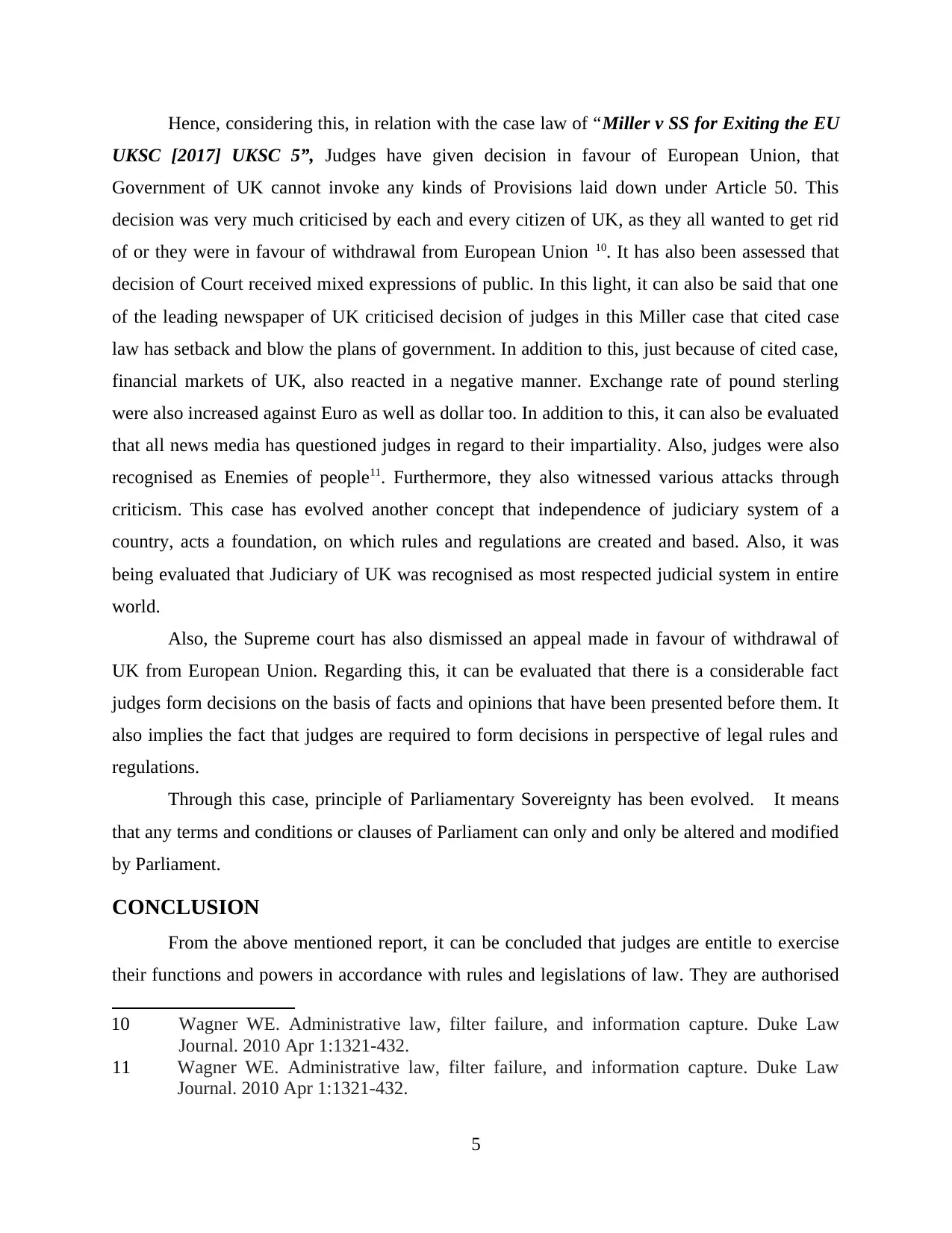
Hence, considering this, in relation with the case law of “Miller v SS for Exiting the EU
UKSC [2017] UKSC 5”, Judges have given decision in favour of European Union, that
Government of UK cannot invoke any kinds of Provisions laid down under Article 50. This
decision was very much criticised by each and every citizen of UK, as they all wanted to get rid
of or they were in favour of withdrawal from European Union 10. It has also been assessed that
decision of Court received mixed expressions of public. In this light, it can also be said that one
of the leading newspaper of UK criticised decision of judges in this Miller case that cited case
law has setback and blow the plans of government. In addition to this, just because of cited case,
financial markets of UK, also reacted in a negative manner. Exchange rate of pound sterling
were also increased against Euro as well as dollar too. In addition to this, it can also be evaluated
that all news media has questioned judges in regard to their impartiality. Also, judges were also
recognised as Enemies of people11. Furthermore, they also witnessed various attacks through
criticism. This case has evolved another concept that independence of judiciary system of a
country, acts a foundation, on which rules and regulations are created and based. Also, it was
being evaluated that Judiciary of UK was recognised as most respected judicial system in entire
world.
Also, the Supreme court has also dismissed an appeal made in favour of withdrawal of
UK from European Union. Regarding this, it can be evaluated that there is a considerable fact
judges form decisions on the basis of facts and opinions that have been presented before them. It
also implies the fact that judges are required to form decisions in perspective of legal rules and
regulations.
Through this case, principle of Parliamentary Sovereignty has been evolved. It means
that any terms and conditions or clauses of Parliament can only and only be altered and modified
by Parliament.
CONCLUSION
From the above mentioned report, it can be concluded that judges are entitle to exercise
their functions and powers in accordance with rules and legislations of law. They are authorised
10 Wagner WE. Administrative law, filter failure, and information capture. Duke Law
Journal. 2010 Apr 1:1321-432.
11 Wagner WE. Administrative law, filter failure, and information capture. Duke Law
Journal. 2010 Apr 1:1321-432.
5
UKSC [2017] UKSC 5”, Judges have given decision in favour of European Union, that
Government of UK cannot invoke any kinds of Provisions laid down under Article 50. This
decision was very much criticised by each and every citizen of UK, as they all wanted to get rid
of or they were in favour of withdrawal from European Union 10. It has also been assessed that
decision of Court received mixed expressions of public. In this light, it can also be said that one
of the leading newspaper of UK criticised decision of judges in this Miller case that cited case
law has setback and blow the plans of government. In addition to this, just because of cited case,
financial markets of UK, also reacted in a negative manner. Exchange rate of pound sterling
were also increased against Euro as well as dollar too. In addition to this, it can also be evaluated
that all news media has questioned judges in regard to their impartiality. Also, judges were also
recognised as Enemies of people11. Furthermore, they also witnessed various attacks through
criticism. This case has evolved another concept that independence of judiciary system of a
country, acts a foundation, on which rules and regulations are created and based. Also, it was
being evaluated that Judiciary of UK was recognised as most respected judicial system in entire
world.
Also, the Supreme court has also dismissed an appeal made in favour of withdrawal of
UK from European Union. Regarding this, it can be evaluated that there is a considerable fact
judges form decisions on the basis of facts and opinions that have been presented before them. It
also implies the fact that judges are required to form decisions in perspective of legal rules and
regulations.
Through this case, principle of Parliamentary Sovereignty has been evolved. It means
that any terms and conditions or clauses of Parliament can only and only be altered and modified
by Parliament.
CONCLUSION
From the above mentioned report, it can be concluded that judges are entitle to exercise
their functions and powers in accordance with rules and legislations of law. They are authorised
10 Wagner WE. Administrative law, filter failure, and information capture. Duke Law
Journal. 2010 Apr 1:1321-432.
11 Wagner WE. Administrative law, filter failure, and information capture. Duke Law
Journal. 2010 Apr 1:1321-432.
5
Paraphrase This Document
Need a fresh take? Get an instant paraphrase of this document with our AI Paraphraser

to act as an impartial and frame decisions with non- biasness. In addition to this, this report, also
witnessed the case of Miller v SS for Exiting the EU UKSC [2017] UKSC 5, through which
Principle of Parliament Sovereignty evolved. Moreover, terms and conditions of Article 50 has
also been discussed in this report.
6
witnessed the case of Miller v SS for Exiting the EU UKSC [2017] UKSC 5, through which
Principle of Parliament Sovereignty evolved. Moreover, terms and conditions of Article 50 has
also been discussed in this report.
6
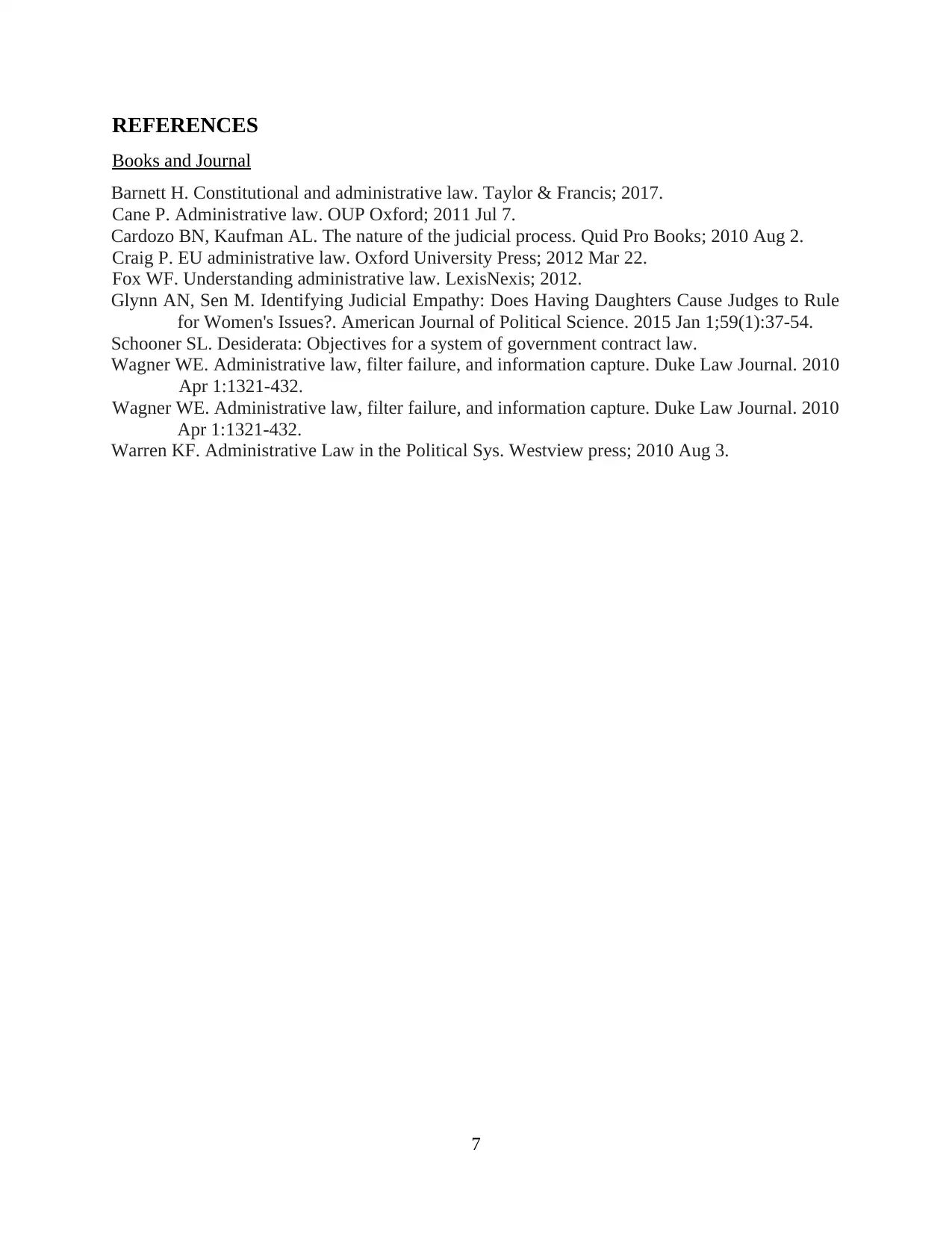
REFERENCES
Books and Journal
Barnett H. Constitutional and administrative law. Taylor & Francis; 2017.
Cane P. Administrative law. OUP Oxford; 2011 Jul 7.
Cardozo BN, Kaufman AL. The nature of the judicial process. Quid Pro Books; 2010 Aug 2.
Craig P. EU administrative law. Oxford University Press; 2012 Mar 22.
Fox WF. Understanding administrative law. LexisNexis; 2012.
Glynn AN, Sen M. Identifying Judicial Empathy: Does Having Daughters Cause Judges to Rule
for Women's Issues?. American Journal of Political Science. 2015 Jan 1;59(1):37-54.
Schooner SL. Desiderata: Objectives for a system of government contract law.
Wagner WE. Administrative law, filter failure, and information capture. Duke Law Journal. 2010
Apr 1:1321-432.
Wagner WE. Administrative law, filter failure, and information capture. Duke Law Journal. 2010
Apr 1:1321-432.
Warren KF. Administrative Law in the Political Sys. Westview press; 2010 Aug 3.
7
Books and Journal
Barnett H. Constitutional and administrative law. Taylor & Francis; 2017.
Cane P. Administrative law. OUP Oxford; 2011 Jul 7.
Cardozo BN, Kaufman AL. The nature of the judicial process. Quid Pro Books; 2010 Aug 2.
Craig P. EU administrative law. Oxford University Press; 2012 Mar 22.
Fox WF. Understanding administrative law. LexisNexis; 2012.
Glynn AN, Sen M. Identifying Judicial Empathy: Does Having Daughters Cause Judges to Rule
for Women's Issues?. American Journal of Political Science. 2015 Jan 1;59(1):37-54.
Schooner SL. Desiderata: Objectives for a system of government contract law.
Wagner WE. Administrative law, filter failure, and information capture. Duke Law Journal. 2010
Apr 1:1321-432.
Wagner WE. Administrative law, filter failure, and information capture. Duke Law Journal. 2010
Apr 1:1321-432.
Warren KF. Administrative Law in the Political Sys. Westview press; 2010 Aug 3.
7
⊘ This is a preview!⊘
Do you want full access?
Subscribe today to unlock all pages.

Trusted by 1+ million students worldwide
1 out of 9
Related Documents
Your All-in-One AI-Powered Toolkit for Academic Success.
+13062052269
info@desklib.com
Available 24*7 on WhatsApp / Email
![[object Object]](/_next/static/media/star-bottom.7253800d.svg)
Unlock your academic potential
Copyright © 2020–2026 A2Z Services. All Rights Reserved. Developed and managed by ZUCOL.




